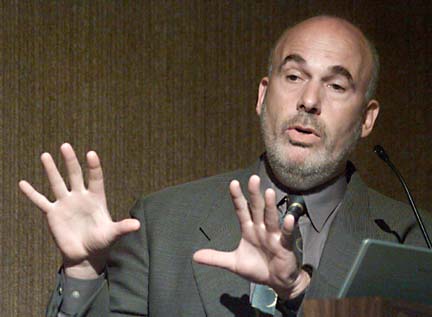

|
Tests to aid
infertile isle couples
The procedure screens embryos for
genetic defects and lowers risk of miscarriage
A new test procedure is available in Honolulu to help infertile couples conceive healthy children by detecting abnormal embryos and minimizing the risk of miscarriage.
The Pacific In Vitro Fertilization Institute at the Kapiolani Medical Center, with the affiliation of the Galileo Research Center, provides the new embryo testing, which increases the pregnancy rate for infertile couples, doctors say.
The procedure also allows for fewer multiple births, said Dr. Jacques Cohen, founder and president of the Galileo Research Center.
The testing, called pre-implantation genetic diagnosis, is a tedious process that screens embryos for genetic defects and allows only normal embryos to be transferred to the uterus.
The testing is part of the in-vitro fertilization procedure where eggs are produced, retrieved from the ovaries and fertilized with the partner's sperm in the laboratory to create embryos.
When the embryos reach the eight-cell stage, which is three days after the egg is retrieved and fertilized, an incision is made to remove one cell from each embryo through a procedure called embryo biopsy.
|
Before this procedure was available, doctors would judge embryos by appearance, said Dr. Philip McNamee, co-founder of the Pacific In Vitro Fertilization Institute. "PGD allows us to test their chromosome makeup."
Women age 35 and over who are at a higher risk of chromosomal disorders or have a family history of a genetic disease can have this procedure to detect any abnormalities.
Those women have 50 percent of their embryos that are normal, whereas those who are 43 years old have 90 percent of their embryos that are abnormal, said McNamee.
"There's a lot of abnormal embryos that are being made because the eggs are abnormal," he added. "Now we can test to see which ones are normal."
Also, women who experienced recurrent miscarriages and couples that experienced multiple unsuccessful in-vitro fertilization or infertility are also good candidates for the procedure.
Cohen said the new procedure can reduce the miscarriage rate to 9 percent from 23 percent.
It also increases the pregnancy rate for infertile couples who are undergoing in-vitro fertilization because the procedure screens out abnormal chromosomes that generally cause miscarriages or prevent successful implantation.
Five women over age 35 have undergone the procedure at the Pacific In Vitro Fertilization Institute since April.
Dr. Thomas Huang, laboratory director of the institute, said the procedure has been available at some centers on the mainland for about five years.
The laboratory in San Francisco, which opened last year, enabled doctors at the institute to do the procedure because of its proximity to Hawaii. Advancements in subculture techniques have also allowed Honolulu doctors to conduct the procedure.
The procedure, however, does pose a risk of affecting the embryo or damaging cells during the biopsy procedure. "It's not perfect," said Cohen. "Every medical treatment comes with probabilities."
Huang said they would like to provide the new procedure to patients in the Pacific Basin such as Japan and Malaysia.
Cost of the pre-implantation genetic diagnosis is $3,000 in addition to the cost of the in-vitro fertilization procedure, which is $8,500 to $13,000.
www.kapiolani.org